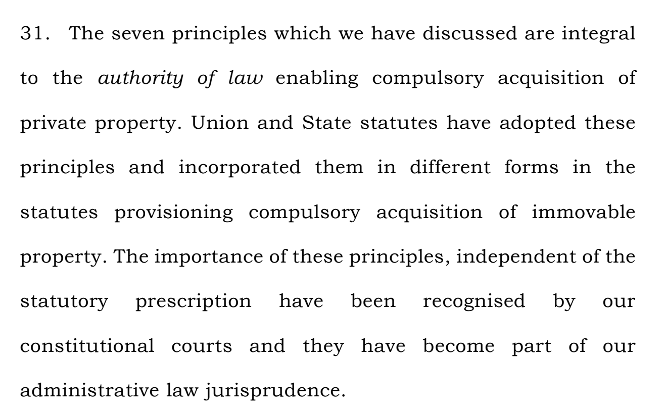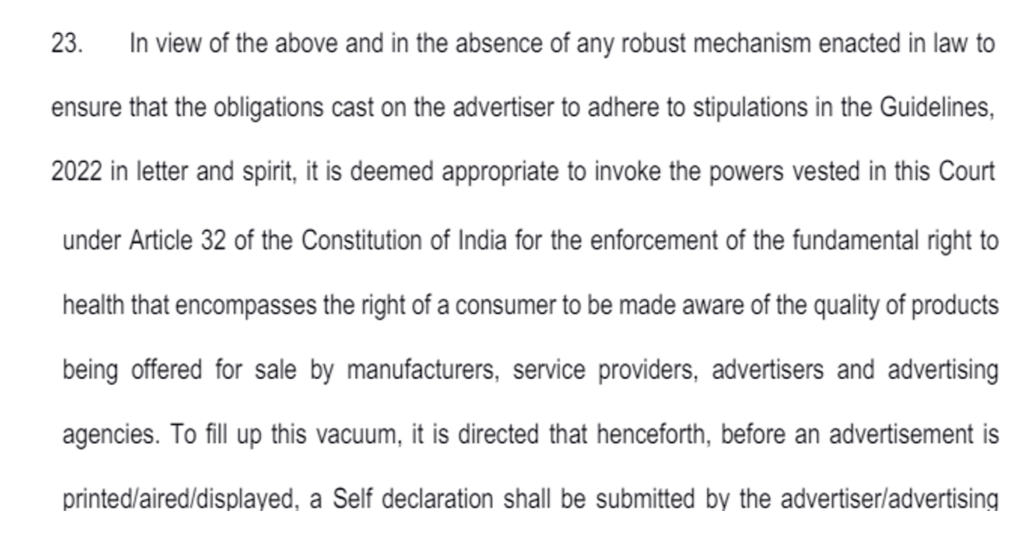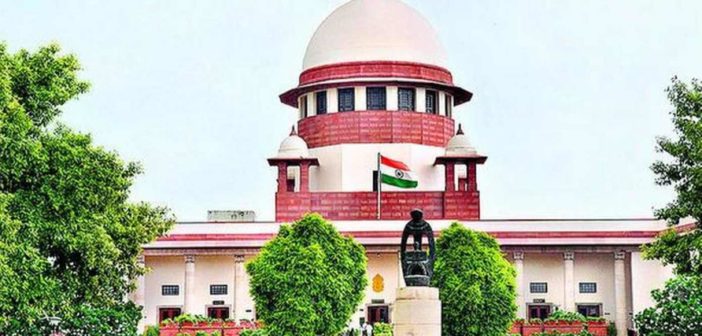In this edition of Court Judgements, we look at the SC’s ruling that stares must protect 7 sub-rights while acquiring Land, SC’s observation that fundamental right to health encompasses right of consumer to be made aware of quality of products, that Hindu woman can claim ownership of property under section 14 (1) of Hindu succession act, if only she possesses it, Madras HC’s order that a person does not need permission from authorities to perform customary religious practices without affecting the rights and freedoms belonging to others.
SC: States must protect 7 sub-rights while acquiring Land
In Kolkata Municipal Corporation (Appellant) vs. Biman Singh (Respondent), the Supreme Court (SC) was dealing with a matter of acquisition of property of the respondent by the appellant. The facts of the case were that the private property of the respondent was acquired by the Appellant, with the claim that it was given the powers to do so by sections 352 and 363 of the Kolkata Municipal Corporation Act. This was contested by the Appellant in the High Court (HC) of Calcutta. The same court held that neither section 352 nor 363 have vested direct power of acquisition to the Appellant; while section 352 had given power to identify the property for acquisition and refer it to the appropriate government for acquisition, section 363 only deals with fair compensation to be paid to the those who properties are acquired. Accordingly, the acquisition of the respondent’s property by the Appellant was held illegal by the HC.
The Appellant challenged this verdict in SC. While upholding the judgment of HC, the SC made several important observations, which are summarized hereunder:
- The constitution mandates for fair procedure of law before any person is deprived of his property.
- Even if the acquisition is compulsory, it will still be invalid if it does not fulfil the fair procedure of law.
- Undue emphasis cannot be laid on compensation to justify the compulsory acquisition. Compensation by itself is not the complete procedure for a valid acquisition.
- Article 300A of the Constitution which declares that “no person shall be deprived of his property save by authority of law” has been characterised both as a constitutional and also a human right. To assume that constitutional protection gets constricted to the mandate of fair compensation would be a disingenuous reading of the text and offensive to the egalitarian spirit of the Constitution.
- The Constitutional right to property must give way to more meaningful renditions, where the larger right to property is seen as comprising intersecting sub-rights, each with a distinct character but interconnected to constitute the whole. These rights are:
- Right to Notice: Duty of the State to inform the person that it intends to acquire his property.
- Right to be Heard: Duty of State to hear objections to the acquisition.
- Right to a Reasoned Decision: Duty of the State to inform the person of its decision to acquire.
- Right of Acquisition only for Public Purpose: Duty of State to demonstrate that the acquisition is for public purpose.
- Right to Restitution of Fair Compensation: Duty of State to rehabilitate and also restitution.
- Right to Efficient and Expeditious process: Duty of the State to conduct the process of acquisition efficiently and within prescribed timelines of the proceedings.
- Right to Conclusions: Final conclusion of the proceedings leading to vesting.

These sub-rights weave themselves into each other, and as a consequence, State action or the legislation that results in the deprivation of private property must be measured against this constitutional net as a whole, and not just one or many of its strands.
SC: Fundamental Right to Health encompasses Right of Consumer to be made aware of Quality of Products
In Indian Medical Association & Anr vs. Union of India & Ors, SC was dealing with regulatory and grievance redressal procedures involved in prohibition and action to be taken, both suo motu and from consumer complaints, against false, misleading, surrogate, children targeting and other advertisements telecasted through Television (TV), Print Media, Internet, and other mediums.
The court noticed that though there are several laws, such as the Cable Television Regulation Act, Advertisement Code, and others, which provide for regulation of advertisements, the action taken figures on the complaints received by different authorities show a dismal picture. Therefore, the provisions of the Consumer Protection Act, which regulates matters relating to the violation of the rights of consumers by false/misleading advertisements, should be implemented with more vigour and intensity.
Further, it also held that the advertisers/advertising agencies are also equally responsible for issuing false and misleading advertisements and that such endorsements routinely made by public figures, influencers, celebrities etc. go a long way in promoting a product. Noticing the absence of a robust mechanism to deal with such issues, the court invoked its power under Article 32 of the Constitution of India and directed for the creation of Broadcast Sewa Portal wherein all the advertisers/advertising agencies are mandated to give a self-declaration that they will not advertise anything in contravention of Rule 7 of Advertising Code. The same direction was asked to be treated as enforcing the law under Article 141 of the Constitution.

SC: In matters of Civil Liberty of Citizen, every Single Day counts
In Amandeep vs. Central Bureau of Investigation (CBI), the SC was dealing with a Special Leave Petition (SLP) filed on the grievance of non-adjudication of bail application for 11 months by the High Court (HC), though the matter was heard by it for nearly 40 times.
The SC held that in the matters of civil liberty of citizens, every single day counts and that keeping the regular bail application pending for more than 11 months deprives the citizen of this valuable right. Accordingly, the SLP was disposed of with a direction to HC to decide on the bail application before the summer vacation.

SC: Hindu Woman can claim ownership of Property under Section 14 (1) of Hindu Succession Act, if only she Possesses it
In Mukatlal vs. Kailash Chand, the SC was dealing with the question of widow’s rights over the property, which were agricultural lands, of Hindu Undivided Family (HUF), in the absence of specific acquisition or possession of the property.
The facts of the case were that the Appellant is the great-grandson of deceased Kishan Lal, who was the sole owner of the property of HUF. Upon his death, the property was succeeded by his two deceased sons, Mangilal and Madholal. The property was vested by execution of a will by Kanwarlal, who is the son of Mangilal, in favour of Appellant Makatlal in 1949. Later, Kanwarlal passed away.
The wife of Madholal, Smt. Nandkanwarbai, in 1958, challenged the vesting of title and possession of property in favour of Mukatlal. This was dismissed by the civil court, but it was held that she had the right to maintenance from the suit property, being the widow. In 1959, Smt. Nandkanwarbai adopted Kailash Chand, Respondent, and in 1972, she passed away. After her demise, the Respondent filed suit, claiming for division of property between Makatlal and himself. The lower court at Ajmer, Rajasthan, dismissed the suit. Subsequently, the HC of Rajasthan gave the judgment in favour of Kailash Chand and held that he had the right over the property. This was appealed against by Appellant, Mukatlal, in SC.
The SC noted that the core question involved in the case is whether the respondent Kailash Chand is the legal heir of the Hindu widow Smt. Nandkanwarbai can claim the right of succession in the unpartitioned Joint Hindu Family property by virtue of Section 14(1) of the Hindu Succession Act, which stipulates “any property possessed by a female Hindu, whether acquired before or after the commencement of this Act, shall be held by her as full owner thereof and not as a limited owner”
The court noted that it was clear from the 1959 verdict of the revenue court itself that Smt. Nandkanwarbai was never in possession of the disputed property, and that she was only entitled to maintenance from the same. This verdict was never challenged by her. In order to establish full ownership of the undivided joint family estate under Section 14(1) of the Succession Act, the Hindu female must not only be possessed of the property but also have acquired the property. However, in the present case, neither Smt. Nadkanwarbai nor her adopted son Kailash Chand were ever in possession of the suit land.
Therefore, the judgment of the Rajasthan HC was set aside, and the appeal was allowed in favour of the Appellant.

Madras HC: Permits Rolling Over on Banana Leaves in which other people had partaken their Food (Angapradakshinam)
In P. Naveen Kumar (Petitioner) vs. District Collector & Ors (Respondents), the Madras HC held that the ancient Hindu religious practice of rolling over on the banana leaves on which other devotees have eaten their food (Angapradakshinam) is permitted and does not need authorities permission.
The facts of the case were that the practice of Angapradakshinam is a 120-year-old tradition, which was stopped by the government in 2015. The petitioner by a representation sought permission from the authorities to perform the same in the current year. Since there was no response from them, the petitioner approached HC.
The HC held that Angapradakshinam is an object of veneration and traditional belief. Each year, many believers of Sri Sadasiva Brahmendral throng to his Samadhi (Tomb) to perform Angapradakshinam as a ritual. In the same way, other religious practices such as devotees of Lord Muruga exhibiting their piety by piercing small hooks on his tongue, devotees of Amman undertaking fire-walk, carrying pot of burning coal etc., are inseparable features of Tamil religious culture. Therefore, the HC held that the right to privacy also includes one’s spiritual orientation, without affecting the rights and freedoms belonging to others.

Accordingly, it held that the petitioner does not need permission from authorities to perform customary religious practices.



